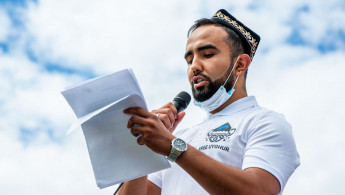Uighur lawyers collecting new evidence to back ICC case
Lawyers fighting to take China to the International Criminal Court for persecuting Uighurs said on Wednesday they were gathering new evidence to be handed to prosecutors "early in the new year."
The Hague-based ICC's chief prosecutor earlier this week turned down a request by exiled Uighurs to probe China for alleged genocide and crimes against humanity.
Fatou Bensouda's office said in its annual report Monday it was unable to act because the alleged acts happened on the territory of China, which was not a signatory to the tribunal's founding Rome Statute.
But lawyer Rodney Dixon said a legal team was now gathering further evidence in ICC member countries outside China.
"To put into simple terms, if somebody is arrested in Tajikistan unlawfully by Chinese officials and forced over the border into a detention camp where they are then persecuted, then the first act, the arrest takes place in an ICC member state," Dixon said.
It gave the court "jurisdiction over all the following connected acts into China," Dixon told an online press conference, held on the sidelines of the ICC's annual member states meeting.
"That is the evidence that we are currently gathering, to show where the crime either started or ended in an ICC member state."
Bensouda's report had said that there was "no basis to proceed at this time" on separate claims of forced deportations of Uighurs back to China from Tajikistan and Cambodia.
Read more: More than 570,000 Uighurs 'forced into China cotton picking camps': report
Dixon said the evidence will be provided to the prosecutor "as soon as we can, early in the new year."
China has called the accusations baseless and says the facilities in the northwestern Xinjiang region are job training centres aimed at steering people away from terrorism.
The ICC has no obligation to consider complaints filed to the prosecutor, who can decide independently what cases to submit to judges at the court, set up in 2002 to achieve justice for the world's worst crimes.
Follow us on Facebook, Twitter and Instagram to stay connected





 Follow the Middle East's top stories in English at The New Arab on Google News
Follow the Middle East's top stories in English at The New Arab on Google News


